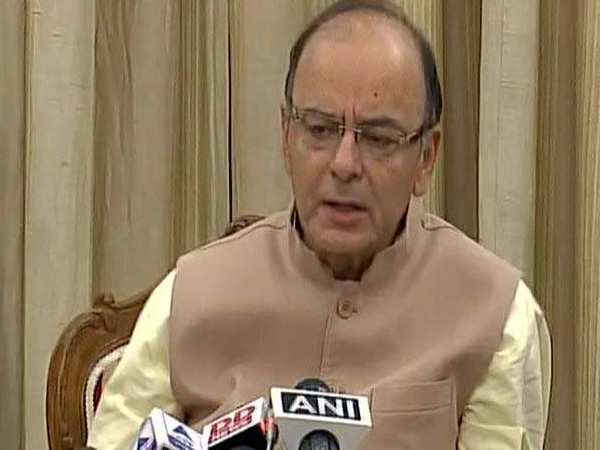New Delhi [India]: Finance Minister Arun Jaitley on Tuesday said in a Facebook post that the opposition Congress Party could be facing a “suicidal future” if they went ahead and legally challenged Rajya Sabha Chairman and Vice President M. Venkaiah Naidu’s decision not to entertain an impeachment motion against Supreme Court Chief Justice Dipak Misra.
“A suicidal future move of the Congress”, Jaitley said of the Congress Party’s decision to move the apex court to rescind Vice President’s Naidu’s order.
Maintaining that the Chairman of the Rajya Sabha and the Speaker of the Lok Sabha had the discretion to admit or decline a motion brought before them, the senior Bharatiya Janata Party (BJP) leader said, “The power to admit or to decline a motion is part of the legislative process of Parliament.”
He further stated, “A motion under Article 124 (4) is no different from any other motion where Chair has the discretion to admit it or decline to do so. There is a conventional view that the exercise of the discretion by the Chair of either House is not justiciable in the court of law. This view gains support from the observations made in the majority opinion of Justice J.S. Verma in the 1992 case (Sarojini Ramaswami vs. UOI) where the court held: “On initiation of the process in the prescribed manner, the Speaker/ Chairman is to decide whether the accusations require investigations. If he chooses not to act on the accusations made in the form of a motion by a minimum number of Members of Parliament, the matter ends there”.”
“For the Congress Party to carry forward its mistake of subjecting legislative processes to judicial review would be a blunder. The Parliament is supreme in its own jurisdiction. Its process cannot be subjected to judicial review,” Jaitley said in his Facebook post.
He described the opposition’s impeachment motion against Chief Justice Misra as entirely misconceived, adding that any such motion has to be only considered and forwarded “in the rarest of rare cases.”
“These cases would include those where a “gross misconduct” has been indulged in by a delinquent judge during his tenure as a judge. There has to be strong and hard evidence to substantiate this. Hearsay and rumor are not a substitute for evidence. The present impeachment motion has been filed on untenable grounds. It has been filed for collateral purpose to intimidate the Chief Justice of India and other judges of the highest judiciary,” Jaitley said categorically.
“The Congress Party is capable of dragging judges into an unsavoury controversy and make them controversial, should their judicial opinion not appear favourable in the cases in which the ‘Party’ (Congress) has an interest. To any political analyst, it was clear that the impeachment motion would never get support of the two-third majority in both Houses of Parliament. The Congress Party knew this. Its object was not the passage of the motion, but the intimidation of India’s judiciary,” he added.
Maintaining that the motion was unquestionably “poorly drafted”, the Finance Minister said, “The level of proof required to impeach a judge of being guilty of “proved misbehaviour” has to be proof “beyond reasonable doubt”. Any inquiry set up subsequent to a possible admission of a motion cannot be a fishing and roving inquiry. The inquiry does not have to search for better evidence or a better set of facts. The motion must contain a definitive case which makes out a case “beyond reasonable doubt” that the judge is guilty of “proved misbehaviour”.
He questioned the opposition impeachment motion on five counts, which were,
Charge 1: When the 64 Members of Parliament present a best case scenario that the Chief Justice of India “may have been involved in the conspiracy of paying illegal gratification”, can it be said that this makes out a possible case, if accepted in totality, one of proof “beyond reasonable doubt”?
Charge 2: When 64 Members of Parliament at best allege that the Chief Justice of India “was likely to fall within the scope of the investigation”, it is not mere conjecture or a surmise rather than a case “beyond reasonable doubt”?
Charge 3: When the Members of Parliament allege that the Chief Justice of India “appears to have anti-dated an administrative order”, is it not mere suspicion or an assumption rather than a charge “beyond reasonable doubt”?
Charge 4: Can a 33 year old allotment of land to an advocate be a “proved misbehaviour” against Chief Justice of India?
Charge 5: Can a different or an alternative view on the allocation of cases by the Chief Justice of India be a case of “proved misbehaviour”.
He said the allegations of the Congress Party were at best vague and unsubstantiated.
He said the Parliament is supreme in its own jurisdiction. Its process cannot be subjected to judicial review.
This was his second Facebook post within a week on impeachment motion against Chief Justice Misra.
It may be recalled that the Congress and six other opposition parties had decided to introduce a motion to impeach Chief Justice Misra in the Rajya Sabha on grounds of proven misconduct while in office. Sixty-three Rajya Sabha members signed the impeachment notice, which was rejected by Rajya Sabha Chairman Naidu. The unrelenting opposition then said that they would approach the Supreme Court to overrule parliament on the notice.
Chairman Naidu said last Sunday that, “We cannot allow any of our pillars of governance to be weakened by any thought, word or action.”
He maintained that the opposition’s allegations were unsubstantiated surmises and conjectures. The Constitution says the Chief Justice of India or any other judge can only be impeached on grounds of proved misbehaviour or incapacity to discharge his official duties. (ANI)

